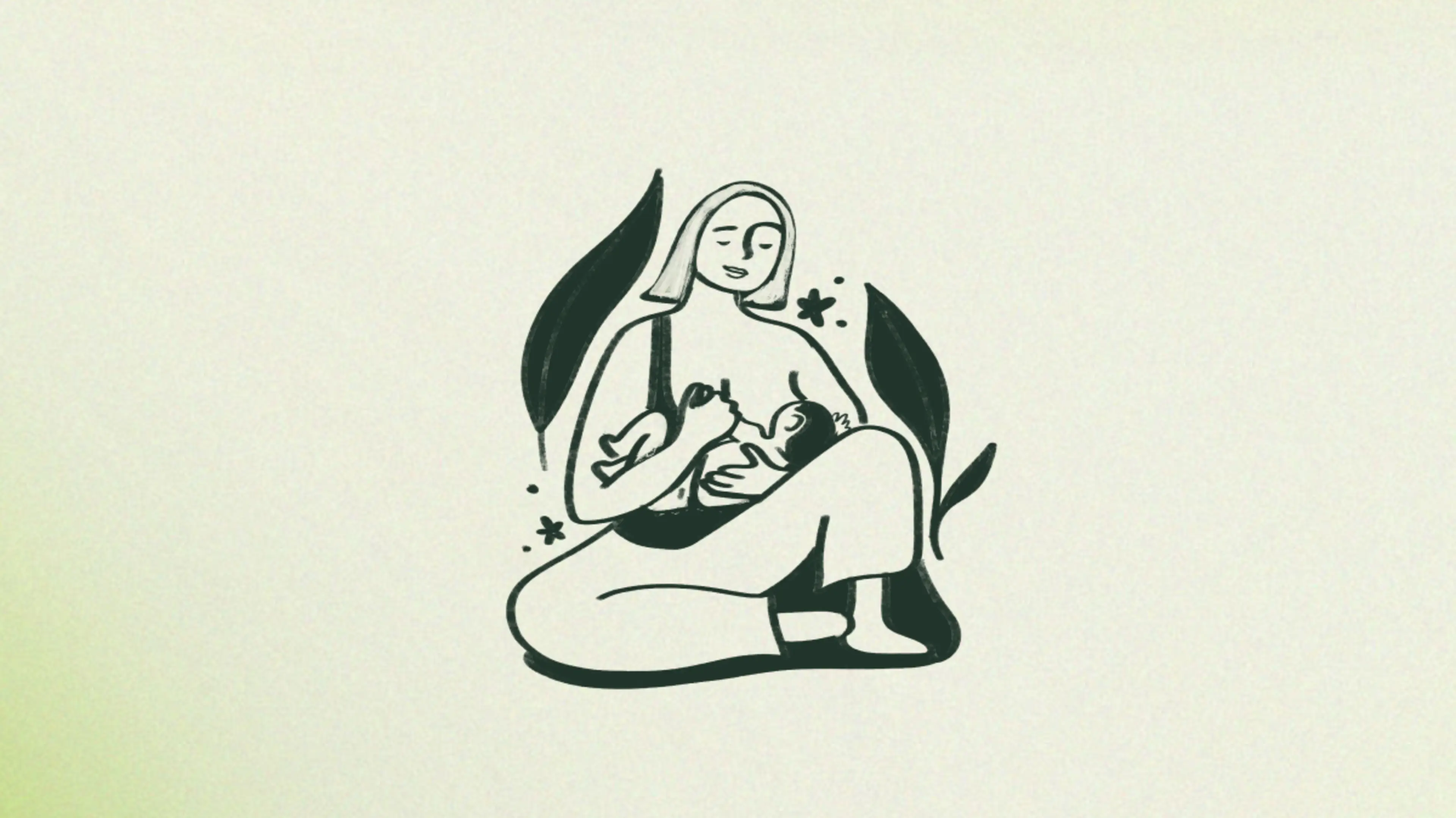Breastfeeding is often portrayed as all warm cuddles and sweet feelings between baby and parent—and sometimes that’s exactly what it is. But any nursing parent knows it’s usually not that simple. Breastfeeding is actually a lot of work and an entirely new skill that takes time to learn for all involved.
With my first, I didn’t set any hard timeline goals for my breastfeeding journey or put much thought into when (or how) I’d wean. I just knew I wanted to breastfeed and was grateful for the ease with which my feeding journey unfolded. When I found out I was expecting my second baby, I had no plans to stop nursing my then-14-month-old. A few months into my pregnancy, however, my body decided otherwise.
I suddenly found myself having very intense negative feelings whenever he was latched. The sensation was unbearable. I was agitated, felt like my skin was crawling, and had an overwhelming urge to yank him off of my breast. And I had no idea what was happening to me. I felt immense guilt that I couldn’t stand nursing him anymore and sadness that something that once brought us so close together was now a source of stress. This was also completely one-sided. I tried really hard to mask my discomfort for fear of making him upset (or unintentionally traumatizing him), but he definitely noticed and didn’t understand why I was so uncomfortable.
Thanks to the online breastfeeding courses I’d taken during my pregnancy, I knew that some people may experience feelings of depression when nursing. However, what I was feeling was so much more than that. I took to the internet to figure out what was happening to me. The first thing I (very quickly) realized: there was little information out there that aligned with my symptoms. Finally, during one particular tear-filled late-night scroll, I stumbled across a website that struck a chord—I was experiencing something called breastfeeding aversion and agitation.
What Is Breastfeeding Aversion and Agitation?
Breastfeeding aversion and agitation (or BAA) is, “a set of symptoms that includes agitation, anger, rage, overstimulation, or a creepy-crawly sensation at the act (or even thought) of putting baby to the breast,” says Anna Brauch, an International Board Certified Lactation Consultant (IBCLC) and someone who has experienced BAA first hand. It’s a jumble of overwhelming sensations or wanting to physically get away from your baby or toddler while they’re latched, and it usually subsides as soon as you remove them from the breast.
Like me, you’ve probably never heard of this before. “I think it’s more common than providers and families realize,” Brauch says. “It’s under-recognized because many lactation providers don't know how to identify it, and many will misdiagnose it as another condition like Dysphoric Milk Ejection Reflex1 (D-MER).”
D-MER is characterized by abrupt, negative feelings or sadness that occur right before a milk letdown (due to a decrease in dopamine levels before milk is released). These feelings usually subside within a few minutes of your letdown occurring, whereas the discomfort with BAA lasts until you unlatch.
Nursing aversion not only means feeling terrible while breastfeeding, but it also often results in guilt and shame for feeling that way in the first place. Because of the stigma around having negative feelings toward your baby, breastfeeding, or parenting in general, “parents may not share their challenges with their provider,” Brauch says. However, it’s important to seek support because, if left untreated, BAA typically gets worse (with the exception of pregnancy-related BAA, which usually resolves after birth).
What Causes Breastfeeding Aversion and Agitation?
Not much is known about why BAA happens or how to treat it since very little research has been conducted. Zainab Yate, author of When Breastfeeding Sucks: What You Need to Know About Nursing Aversion and Agitation2 has been at the forefront of educating nursing parents and campaigning for more support since she experienced BAA in her own nursing journey and wasn’t able to find anyone to help. She also started a Facebook group so parents experiencing nursing aversion can connect with others. It currently has over nine thousand members (BAA can make you feel alone, but you’re truly not!). Yate says the likely cause of BAA is a combination of three different things: “hormonal factors, some psychological factors (that are common when moms are struggling), and social reasons.”
While not much is known about the cause of BAA, some common threads exist among those who experience it. These include:
Hormonal factors
Nursing while pregnant
Menstrual cycle hormone fluctuations
Decreased milk supply or dry nursing
Lack of sleep
Dehydration
General burn out
Feeling touched out
What Can You Do About It?
Most of the treatment for BAA centers around making sure you’re meeting your own needs (we know, much easier said than done). And most of it is anecdotal because treatments haven’t been studied. Staying well hydrated, eating nourishing foods, getting fresh air, and carving out a little bit of time for yourself each day are great places to start.
As soon as you notice the signs, you should seek support from a lactation consultant, as well as a licensed therapist, who can be helpful with general parenting challenges but even more so when you’re navigating big emotional obstacles like nursing aversion.
As mentioned earlier, some believe BAA is triggered by hormones, specifically a dip in oxytocin production3 (which typically spikes during nursing sessions to help with letdown and bonding). The return of your period postpartum also sends oxytocin levels plummeting4 during certain points in the menstrual cycle. Many parents share that taking a magnesium supplement5 , whether orally or topically, can help alleviate aversion symptoms. The possible science behind this lies in magnesium’s interaction with oxytocin receptors and the fact that magnesium is an important component6 of many metabolic reactions in the body. You should also be sure to get plenty of magnesium-rich foods in your diet like salmon, almonds, black beans, avocado, cooked spinach, and bananas. And make sure you consult your provider before beginning any supplements.
Cognitive distraction strategies are also recommended, “to take your brain's focus away from the negative emotions [which can help to] lessen them,” Yate says. This can look like scrolling your phone, listening to a podcast, watching your favorite show, or even holding an ice cube. She also says, “mindfulness, simple meditation, and breathwork can work wonders.”
If you’re nursing an older baby or toddler, it can help to set some boundaries. This can look like only letting them nurse at certain times of the day (like before naps or bed) versus on demand. You can also set time limits, which can help to lessen comfort nursing, which I personally found to be a huge trigger.
Setting boundaries is ultimately what helped me the first time around. My son was already beginning to self-wean and the combination of my milk supply dipping during my pregnancy and establishing limits ultimately nudged us closer and closer to ending our feeding journey. When my second was around 18 months old, I started noticing those same feelings creeping back in (although I was not pregnant this time). Setting boundaries helped me cope but I also had to lean into cognitive distraction as well. While it hasn’t been easy, we’re approaching two years of our nursing journey with the help of these strategies and professional support. I’m hoping to follow her lead in weaning, but I also am at peace with the fact that it’s ok for me to make that decision for us if that’s what becomes necessary for my own mental health.
You may also decide you need to wean to help deal with feeding aversion. Weaning isn’t always easy and many times either the nursing parent, little one, or both, aren’t ready to end their breastfeeding journey. It’s helpful to try other things before taking this route.
If you’re experiencing breastfeeding aversion, please know that you are not alone. Yate's biggest piece of advice to those struggling with breastfeeding aversion is to remember that, “negative emotions aren't bad (or wrong), [our emotions exist] on a spectrum and all mums will feel some of them.”








